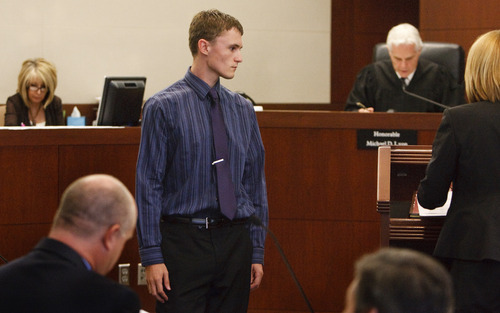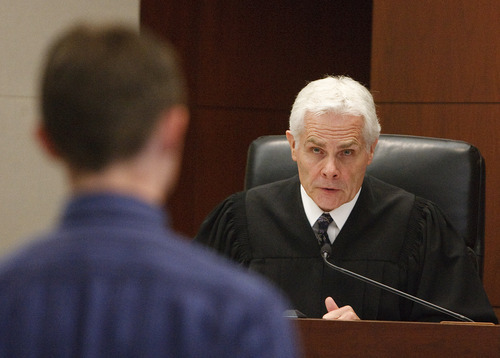This is an archived article that was published on sltrib.com in 2012, and information in the article may be outdated. It is provided only for personal research purposes and may not be reprinted.
Ogden •An 18-year-old Roy High School student accused of plotting to bomb the school in January pleaded no contest to reduced charge of second-degree felony criminal mischief on Thursday.
Dallin Todd Morgan was originally charged with one count of first-degree felony possession of weapon of mass destruction, which is punishable by up to life. The criminal mischief count is punishable by up to 15 years in prison.
Second District Judge Michael Lyon, however, immediately sentenced Morgan to 18 months probation, 105 days in jail and a $500 fine. If Morgan successfully completes probation, the charge will be amended to class A misdemeanor.
Morgan and another student, a 16-year-old boy, were arrested Jan. 25, after other students reported receiving troubling text messages from the boy.
Subsequent searches turned up no explosives, but police said they did find plans for an explosive device, along with maps of the school and its security.
Police have said they allegedly planned to detonate a bomb during a school assembly, then steal an airplane and fly away to freedom.
Deputy Weber County Attorney Dean Saunders said the plea deal was appropriate because Morgan was "much less culpable" than the 16-year-old.
"The other person was the driving force behind it," said Saunders, referring to the 16-year-old's role in the bomb plot.
Saunders said finding an appropriate punishment for Morgan was somewhat of a challenge, because Morgan had only been 18 — and a legal adult — for a month at the time of his January arrest.
The 16-year-old's case, on the other hand, was handled in juvenile court.
"That person will not end up with an adult record," he said. "[Morgan] will."
Defense attorney Brenda Beaton said Morgan accepted the deal because "he feels a trial in this situation is too risky."
Morgan did not make a statement during the hearing.
Prosecutors agreed that if Morgan were accepted into the military, his probation would be shortened to a year. Lyon ruled that this option would be available, but that proof of his acceptance into the military must be provided to the court.
In April, the 16-year-old was ordered to spend at least six months in a secure juvenile detention facility.
The boy told 2nd District Court Juvenile Judge Janice Frost that he never planned to hurt anyone and that he invented the bomb plot, and purposely leaked it to other students, out of frustration at being ignored when he tried to raise concerns about measures to prevent a school shooting.
The boy — a staff member at the student newspaper — wrote a story in April 2010 outlining the high school's plan for handling a school shooting or similar event. He specifically cited the deadly shootings at Columbine High School and Virginia Tech and pointed out what he felt were shortcomings in Roy High's "preventative security measures."
Last year, the teen traveled to Colorado to interview the principal of Columbine for another story. But the school pulled the plug on the article before he left for the interview, said Scott Nickle, the teen's defense attorney.
Upset at being "dismissed" about the dangers of a mass shooting, the teen in January decided to try "a last ditch attempt" to scare teachers and students into awareness, Nickle said, by creating the bomb plot and sending a text to a student who likely would contact school administrators.
"I felt invalidated," he told Frost. "My initial goal was awareness."
Prosecutors had been working to certify the 16-year-old as an adult, which potentially could have landed him in prison for up to life. But the boy avoided that possibility by pleading guilty as charged to first-degree felony possession of weapon of mass destruction.
In addition to detention, the judge ordered the boy to pay $8,000 to $10,000 in restitution, which was the cost of re-keying all door locks at the high school. The locks were changed because the teen — who was a technician for the drama department — at one point had the keys to the school.
The teen's father said in court in April that while his son overstepped the line, he believes the situation could have been avoided if the boy's concerns about the lack of school security had been addressed.
"We understand the route he took was inappropriate," the man said.
"That's why we are so supportive of what [juvenile authorities] are doing now."
A juvenile parole board will determine when the 16-year-old is released from detention. Juvenile offenders can be held until they turn 21.
The Tribune generally does not name juveniles charged with crimes.









